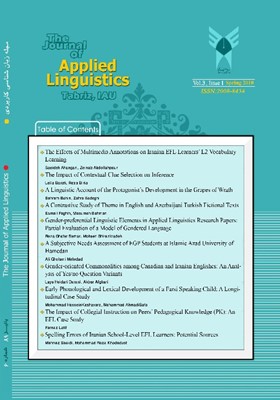A Linguistic Account of the Protagonist’s Development in the Grapes of Wrath
الموضوعات :
1 - English Department, Shahid Madani University
Of Azarbaijan
2 - English Department, Shahid Madani University
Of Azarbaijan
الکلمات المفتاحية: Discourse, Characterization, The Novel, Linguistic analysis, Systemic Linguistics, Teaching Language through Literature,
ملخص المقالة :
The novel as a modern literary genre is generally regarded as the realization of its main character's journey from immaturity to a status of maturity. The character, usually an uncomplicated person unable to cope with the complexities of life at first, gains an insight and understanding to handle his/her complex situation accordingly later in the novel. It is usually agreed in both literary criticism and linguistic criticism of literature that everything about a character should be established from the evidence of the text (see Fowler, 1977 & 1996 and Peck & Coyle, 2002, for instance). In the present study, the language of Tom Joad, the main character in John Steinbeck's The Grapes of Wrath, was analyzed to reveal how his social position is established and how his transformation from a young farm-hand holding a carpe diem philosophy to a socially-wise reformist with a commitment to bettering the future is substantialized. Oriented towards a linguistic study of literature, the present paper employsSystemic Functional Linguistics (SFL) as the analytic framework. The findings of the study may be useful especially for those involved in teaching English language through literature.
Alexander, C. (1965) John Steinbeck’s The Grapes of Wrath. New York: Prentice Hall.
Barnett, M. A. (1991) Language and literature. ADFL Bulletin 22 (3), 7–11.
Doyle, B. (1989) English and Englishness. London: Routledge.
Eaglestone, T. (2000) Doing English. A Guide for Literature Students (2nded.). London and New York: Routledge.
Eggins, S. (1994). An Introduction to Functional Grammar. London: Pinter Publishers.
Fontenrose, J. (1963). John Steinbeck, An Introduction and Interpretation. New York: Holt, Rinehart, Winston, Inc.
Fowler, R. (1977) Linguistics& the Novel. London: Routledge.
Fowler, R. (1996) Linguistic Criticism. Oxford: Oxford University Press.
Hall, G. (2005). Literature in Language Education. New York: Palgrave MacMillan.
Halliday, M. A. K. (1971) ‘Linguistic Function and Literary Style’ in J. Webster (Ed.) (2002) Linguistic Studies of Text and Discourse (pp. 88-122). London and New York: Continuum.
Halliday, M. A. K. (1978) Language as Social Semiotics. London: Edward Arnold.
Halliday, M. A. K. (1988)An Introduction to Functional Grammar. London: Edward Arnold.
Kramsch, C., &Kramsch, O. (2000). The avatars of literature in language study. Modern Language Journal,84, 553–73.
Leech, G., & Short, M. (1981) Style in Fiction: A Linguistic Introduction to English Fictional Prose. London and New York: Longman Group Limited.
MacCabe, C. (1987) The state of the subject (I). Critical Quarterly,29, 5–8.
MacRae, J. (1991).Literature with a Small ‘l’. London: Macmillan.
Palmer, D. J. (1965).The Rise of English Studies: An Account of the Study of English Language and Literature from its Origins to the Making of the Oxford English School. Oxford: Oxford University Press
Peck, J.,& Coyle, M. (2002) Literary Terms and Criticism. New York: Palgrave Macmillan.
Steinbeck, J. (1946) The Grapes of Wrath. New York: Bantam Books
Thompson, G. (2004). Introducing Functional Grammar. London: Arnold.
Todorov, T. (1990) Genres in Discourse. Trans. C. Porter. Cambridge: Cambridge University Press
Widdowson, H.G. (1975) Stylistics and the Teaching of Literature. Essex: Longman.


